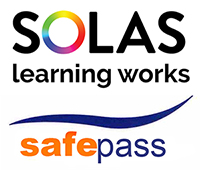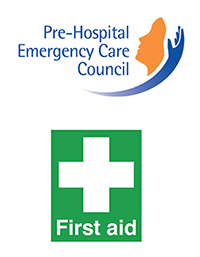Safe Pass:

SOLAS has been given the go ahead by its parent Department, the Department of Education and Skills. The Department has given SOLAS strict instructions on the conditions that training organisations and tutors must comply with before SOLAS can authorised their recommencing training and assessment. Training organisations and tutors will have to:
The Guidelines provide that:
The guidelines cover matters such as cleaning, dealing with a suspected Covid-19 case, masks and thermometers. It is advisable that thermometers should be contactless.
Construction Skills Certification Scheme (CSCS) card renewal:
 The Safety, Health and Welfare at Work (Construction) Regulations 2013 still apply on construction projects and therefore, the categories of workers carrying out operations listed on Schedule 5 of the Regulations, must be in possession of current cards – the renewal of these cards does not require the attendance at a training / renewal programme and can be achieved by following the instructions below;
The Safety, Health and Welfare at Work (Construction) Regulations 2013 still apply on construction projects and therefore, the categories of workers carrying out operations listed on Schedule 5 of the Regulations, must be in possession of current cards – the renewal of these cards does not require the attendance at a training / renewal programme and can be achieved by following the instructions below;
Renewal of CSCS Card
To renew a CSCS Experienced Operator Registration Card, complete the online form at: https://cardrenewals.solas.ie/#/cscs/renew and attach a current passport-quality photograph together with an online payment.
Replacement CSCS Card
If a CSCS Registration Card has been lost, stolen or damaged, the owner can apply for a replacement, attaching a current passport-quality photograph together with an online payment. See: https://cardrenewals.solas.ie/#/cscs/replace
First Aid Responder Training

Please see below from PHECC regarding FAR certification;
Be advised that PHECC Council, at their meeting on January 21 2021, further advise that if a Responders certification has expired between March 2020 and July 31st 2021, a Responder may complete the refresher course to maintain certification.
Any PHECC responder certification that has lapsed after 31st July 2021 date, a new responder course will need to be completed.
Advice on Statutory Inspections
Several pieces of legislation enforced by the Health and Safety Authority contain provisions that require inspections to be undertaken by competent persons at predefined statutory intervals. Such legislation includes the Safety, Health and Welfare at Work (General Application) Regulations 2007 (S.I. No. 299 of 2007) in respect to equipment used for working at height including scaffolding and lifting equipment and the Safety, Health and Welfare at Work (Construction) Regulations 2013 (S.I. No. 291 of 2013), in respect to excavations and personal flotation devices. The continued safe use of this equipment depends, in a large part, on the continued safety of the equipment and accessories involved. Failures in this type of equipment can have significant or even fatal consequences for workers and members of the public. Duty-holders have a legal responsibility to maintain workplaces, and work equipment in a condition that is safe and to ensure that any required statutory inspections, examinations or testing are undertaken as required. Prior to allowing persons to use equipment for working at height including scaffolding and lifting equipment, or use of personal flotation devices or work in excavations the duty holder must determine the safety of same. This is in part determined by the carrying out of inspections in respect to each of the above.
There is currently no derogation in respect of the provisions of the Safety, Health & Welfare at Work Act 2005 or its associated statutory provisions as a result of the Covid-19 public health situation. Employers are reminded of their general duty to ensure, so far as reasonably practicable, the safety health and welfare at work of their employees and that of others who may be present at the place of work. Additionally, employers must continue to ensure, so far as reasonably practicable, the design, provision and maintenance of work at height equipment including scaffolding and lifting equipment as well as personal flotation devices and excavations so that they are safe and without risk to health. Should duty-holders have any concern about the continued safe use of work at height equipment including scaffolding, lifting equipment or personal flotation devices it should be removed from service until such concerns have been appropriately addressed. Likewise should duty-holders have any concern about the safety of excavations, they must not allow any persons enter same.
These statutory inspections relate to places of work and there is no legal requirement to carry out these inspections during a time when the site is closed down. Employers should ensure that their sites are left in a safe condition for the duration of any shut down. All equipment and excavations must be inspected by a competent person prior to being reused and the appropriate inspection forms completed as required.
Employers are advised to follow the latest public health advice and to identify and implement suitable control measures to mitigate the risk of COVID-19 infection in the workplace. These measures should be communicated to all relevant employees and others at the place of work. Competent persons who are working on site where there are restrictions arising from the risk of COVID-19 should comply with site rules and also take into account public health advice around preventing the spread of COVID-19. Public health advice is available on the Department of Health, HSE and Health Protection Surveillance Centre websites.
During inspections, the Authority will take into consideration all matters of fact when deciding the appropriate level of action to take where any contravention of the relevant statutory provisions are observed.
As mentioned above, there is currently no exemption for or relaxation of the legislative requirements in respect to the undertaking of statutory inspections, examinations or testing. However, the Health and Safety Authority recognises this is a fluid situation, and we are keeping matters under review.